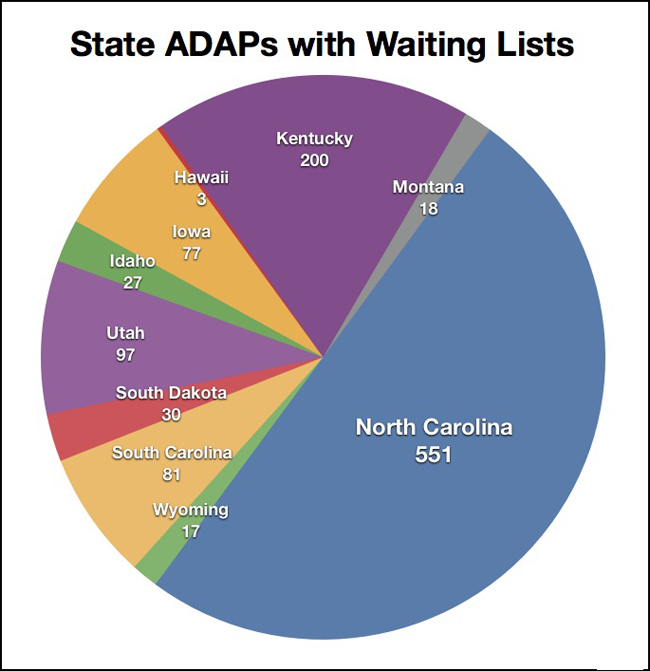Have you ever heard of something called ADAP? Unless you’re poor and HIV-positive, probably not. It’s a state and federal program that provides life-saving drugs to people who have no other place to turn — people who have no insurance or can’t afford the several thousands of dollars it can cost a month to buy the medications. 125,000 people across the country are helped by ADAP (ADAP stands for AIDS Drug Assistance Program) and 6,000 of those people live in North Carolina.
As of January, enrollment in the program here closed because funding dried up. North Carolina has the largest waiting list of people in the country — 551 as of last Friday — more than all the other states with waiting lists combined.
Originally, the program included anti-retroviral drugs (called “Tier I” drugs) as well as medications needed for heart disease, diabetes, infections, mental illness, and many other conditions commonly experienced by people living with HIV/AIDS (called “Tier II” and “Tier III” drugs). As of March, Tier II and Tier III drugs are now no longer covered for people here in North Carolina.
North Carolina’s budget shortfall, the bad economy, increases in unemployment, and minimal increases in federal appropriations have all contributed to the crisis, as has the success of our state’s expanded testing initiatives, HIV awareness, and revised treatment guidelines that focus on earlier treatment. The supply, in essence, can’t meet the increased demand; for 551 of our fellow North Carolinians, that means that they simply can’t get the drugs they need to survive.
And the list continues to grow. According to the Duke University AIDS Legal Project, the primary groups affected include kids “aging out” of Medicaid, workers who have lost jobs and insurance, inmates being released from prison, and people newly diagnosed with HIV.




There is something seriously wrong with our “altruistic” priorities when we continue to send church missions, armed forces, care packages, etc., all over the globe while so many of our own people are suffering from medical afflictions, nutritional deprivation, homelessness, hopelessness.
ADAP is the safety net for so many people here, and across the nation, however, we also must advocate for more prevention dollars so that new HIV infections are reduced below the 56,300 that annually occur in the USA (1-800-CDC-INFO http://www.cdc.gov). Tuesday, May 25th, people from across the state will meet in Raleigh for a day of advocacy at the General Assembly. If you can’t be there, please write or call your Senator and Representative about increasing ADAP funding, prevention dollars, and housing. End the stigma and ignorance about HIV/AIDS,STDs, and Hepatitis.